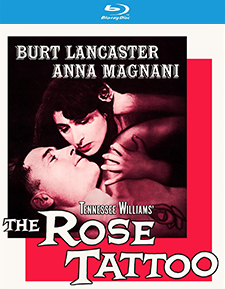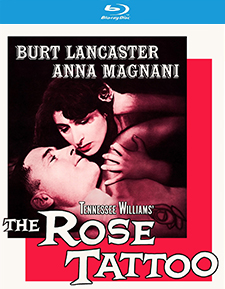Rose Tattoo, The (Blu-ray Review)

Director
Daniel MannRelease Date(s)
1955 (July 9, 2024)Studio(s)
Paramount Pictures (Kino Lorber Studio Classics)- Film/Program Grade: A
- Video Grade: A
- Audio Grade: A
- Extras Grade: B
Review
The 1950s saw many of Tennessee Williams’ plays adapted into films. The Glass Menagerie, A Streetcar Named Desire, Cat on a Hot Tin Roof, and Suddenly, Last Summer achieved critical acclaim and popular success at the box office, as did The Rose Tattoo, which combined the talents of a Hollywood movie star and an Italian actress in her first American film.
Serafina Della Rosa (Anna Magnani) is an immigrant seamstress from Sicily living on Florida’s Gulf Coast. She adores her handsome husband, Rosario, a truck driver who, unbeknownst to her, is also a small-time smuggler. When he dies in a police chase that ends in a fiery accident, she becomes reclusive, mourning his death for years and causing her young daughter, Rosa (Marisa Pavan), great distress. Now about to graduate from high school, Rosa meets and falls in love with sailor Jack Hunter (Ben Cooper). They want to marry, but Serafina is suspicious of Jack’s motives and tries to force Rosa to be as reclusive and repressed as she is.
Serafina learns that her trusted husband was unfaithful and his mistress had the rose tattoo on his chest copied onto her own. Rosa becomes consumed with ferocious grief at his betrayal and jealousy of her daughter’s new-found love turns into extreme possessiveness. However, when she meets another handsome truck driver at a church bazaar, the stifling barriers she has established for herself begin to fade. The man is Alvaro Mangiacavallo (Burt Lancaster), a high-spirited fellow who’s attracted to Serafina and rekindles a long-dormant flame within her.
Magnani’s performance is extraordinary. Her emotions—grief, anger, lust, and joy—are conveyed with such totality that they become entirely believable. With another actress, such a performance might be regarded as “actorly” or grandstanding, but Magnani makes them completely believable. What’s more, she’s absolutely riveting on screen, with her darting, suspicious eyes and body language conveying smoldering passion beneath a veneer of gentility and mourning. She can be equally effective with a fiery temper or consumed with grief as with enchantment by Alvaro’s clownishness. The entire first half of the film is devoted to Magnani’s Serafina. Lancaster doesn’t make his first appearance (with one brief exception) until 50 minutes into the film. And it’s worth the wait.
With a performance that holds its own against Magnani’s, Lancaster plays Alvaro as a carefree lover of life who manages to find joy in everything. His laugh is as big and impressive as his physique. He’s quite the opposite of Serafina, and his physicality and good looks soften her hard heart. There’s an easy camaraderie between them, making it seem as if they’ve known each other for years. It takes a while, but she can’t resist Alvaro. However, there are setbacks, disappointments, suspicions, and recriminations when the two personalities clash.
Pavan and Cooper, as the young lovers, offer contrast to Serafina and Alvaro. Idealistic, seeing only happiness ahead, they’re eager to start a life together. Though they lack the instant chemistry of Magnani and Lancaster, their characters are pleasant and represent a budding relationship free of psychological baggage.
Director Daniel Mann nicely opens up the stage play, even though a lot of the action takes place in Serafina’s home. There are scenes in a nightclub, at a tattoo parlor, and on the streets near Serafina’s house. The best parts of the film are the scenes between Magnani and Lancaster and their obviously comfortable rapport. They bristle with dialogue from Williams’ own screenplay, adapted by Hal Kanter. Lancaster is funny and almost boyish in his playfulness with Magnani, as his Alvaro woos and tries to charm Serafina. Lighter in tone than other Tennessee Williams works, The Rose Tattoo draws us in with its portrait of Serafina, brought to life in a terrific showcase performance by Anna Magnani.
The Rose Tattoo was shot by director of photography James Wong Howe on black-and-white 35 mm film in VistaVision, finished photochemically, and released in the aspect ratio of 1.85:1. The Blu-ray edition from Kino Lorber Studio Classics features an aspect ratio of 1.78:1, sourced from a 4K scan by Paramount Pictures. Contrast and clarity are excellent. The picture is sharp, nearly pristine, with details well delineated, especially wallpaper patterns, women’s hair, Serafina’s flowered dress, and Rosa’s sheer dress. Blacks are deep and rich, and the grayscale is pleasing to the eye. Outdoor scenes are bright, almost sun-drenched, suggesting steamy Florida. Interiors are shadowy with little intense illumination. Serafina seems to struggle to see what she’s sewing. A rose that Alvaro gets tattooed on his chest is seen over the shoulder of the tattoo artist’s shoulder.
The soundtrack is English 2.0 Mono LPCM. English SDH subtitles are an available option. Dialogue is clear, though Magnani’s accent is sometimes hard to understand. Her speaking voice is highly emotional. The score by Alex North (A Streetcar Named Desire) can be sad and melancholy, as when Serafina learns of her husband’s death, or playful during scenes of Alvaro trying to impress Serafina. Sound effects include a speeding truck, police sirens, a crash, ambient crowd noise at a bazaar, and a player piano.
Bonus materials on the Region A Blu-ray release from Kino Lorber Studio Classics include the following:
- Audio Commentary by Julie Kirgo and Peter Hankoff
- Trailer (2:32)
- Come Back, Little Sheba Trailer (2:25)
- Kiss the Blood Off My Hands Trailer (1:37)
- Judgment at Nuremberg Trailer (3:02)
- Fitzwilly Trailer (2:33)
The Alan K. Rode audio commentary and the featurette To Prepare for Discovery: An Anna Magnani Rhapsody from the 2022 Imprint Films Blu-ray are not included.
Audio Commentary – Film historian/writer Julie Kirgo and writer/filmmaker Peter Hankoff note that many of Tennessee Williams’ plays have been adapted into movies, sometimes several times per title, and of them all, The Rose Tattoo is the least known. Williams’ themes of volatility, sexuality, hypocrisy, vulgarity, isolation, delusion, brutality and violence are all reflected in The Rose Tattoo. Many of Williams’ films were condemned by the Catholic Legion of Decency but became huge hits nonetheless. The scene of Serafina lavishing affection on her husband and objectifying him was adventurous for the time period. The term “pregnant” is never used, but Serafina frequently puts her hands on her belly to suggest she’s expecting. Serafina’s husband is a smuggler, but it’s never made clear exactly what he’s smuggling. The film was shot in Key West, Florida, next to Williams’ own Florida home. Kirgo and Hankoff provide expansive career overviews of director Daniel Mann and producer Hal Wallis. Writer Hal Kanter was prolific, working in early TV with stars Milton Berle, Dinah Shore and George Gobel. He also wrote for the TV show Julia, the first series program with a black woman as its central character. Marisa Pavan was the twin sister of Pier Angeli, whose career was more successful at the time. As Serafina’s daughter, Rosa, Pavan is “one hot mama.” Kirgo is a big Burt Lancaster fan and discusses his versatility in such diverse movies as The Killers, From Here to Eternity, Birdman of Alcatraz, Judgment at Nuremberg, Sweet Smell of Success, and The Swimmer. He was able to go from a big studio picture to a smaller, independent film with ease. The Rose Tattoo was made just before the explosion of rock & roll and deals with inter-generational conflict. TV was taking a huge chunk out of Hollywood’s box office, so movies started to include more adult, even taboo subjects. Rosa is more aggressive than her sailor boyfriend and eager to lose her virginity. It was unusual to portray a young woman as the sexual aggressor. The film reflects a lot of “cliche busting” in the days when censorship was pretty rigid. Maureen Stapleton played Serafina on Broadway and won a Tony. Anna Magnani felt she couldn’t do eight performances a week since her English was shaky, but when the film was being planned, her English had improved and she was eager to play the role. The Rose Tattoo received many Oscar nominations and won three. This commentary differs from the Alan K. Rode commentary on the 2022 Imprint edition of The Rose Tattoo in that it is more personal. Kirgo and Hankoff spend a good deal of time talking about actors and films they like in addition to The Rose Tattoo. The commentary is chatty but fails to go into depth about the making of the movie. The Rode commentary is more methodical in covering pre-production, tracing the careers of Lancaster and Magnani, talking about a transitional period in Hollywood, and explaining the challenges of adaptation.
Instead of Williams’ trademark decadence, the South in The Rose Tattoo focuses on the Italian immigrant experience. Anna Magnani’s performance adds credibility to Sicilian views of family, gender roles, and honor. Burt Lancaster overacts as Alvaro, but it’s appropriate for the role. His character brightens Serafina’s bleak, years-long despair and allows her to see that life offers more for her than loneliness and bitterness.
- Dennis Seuling

